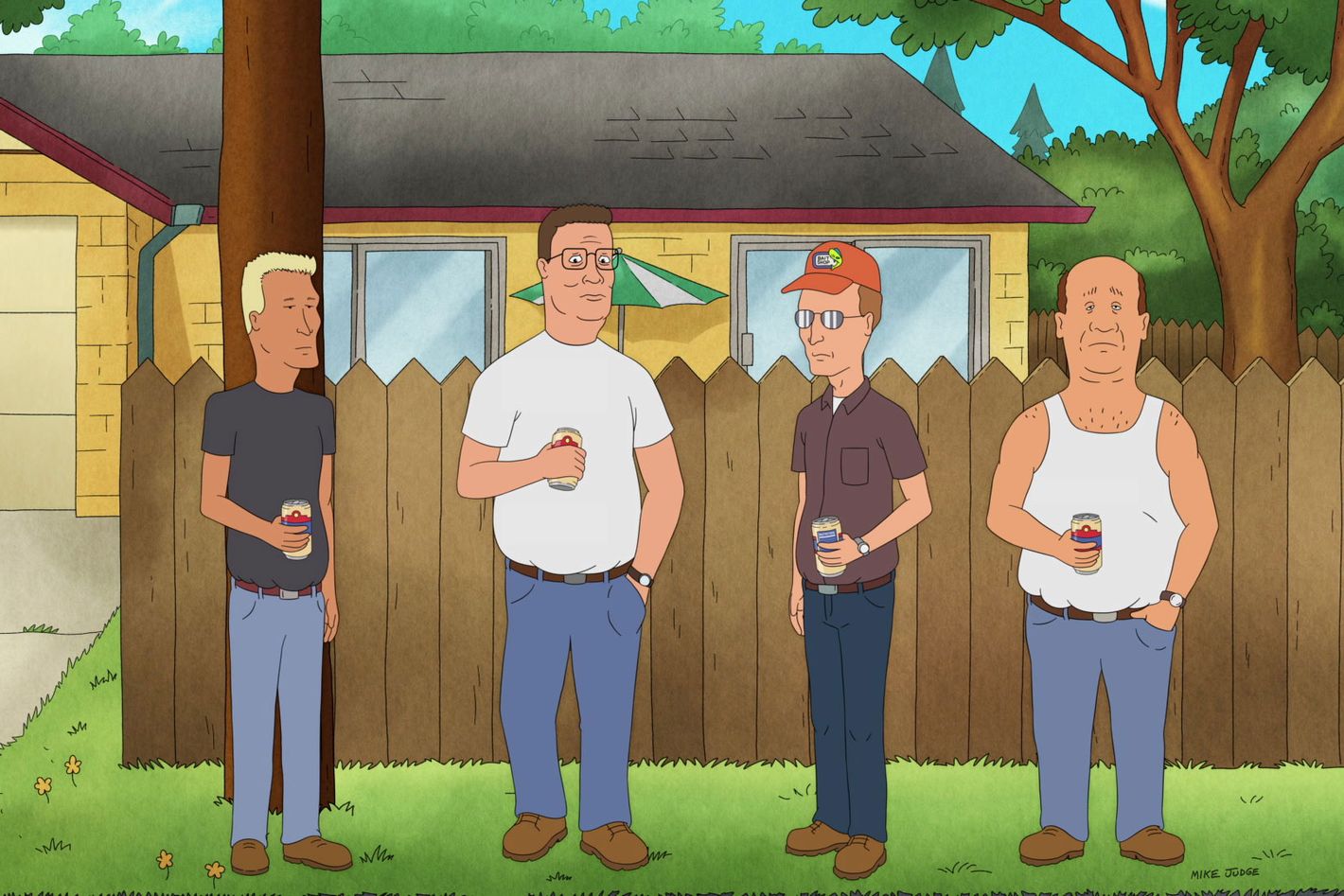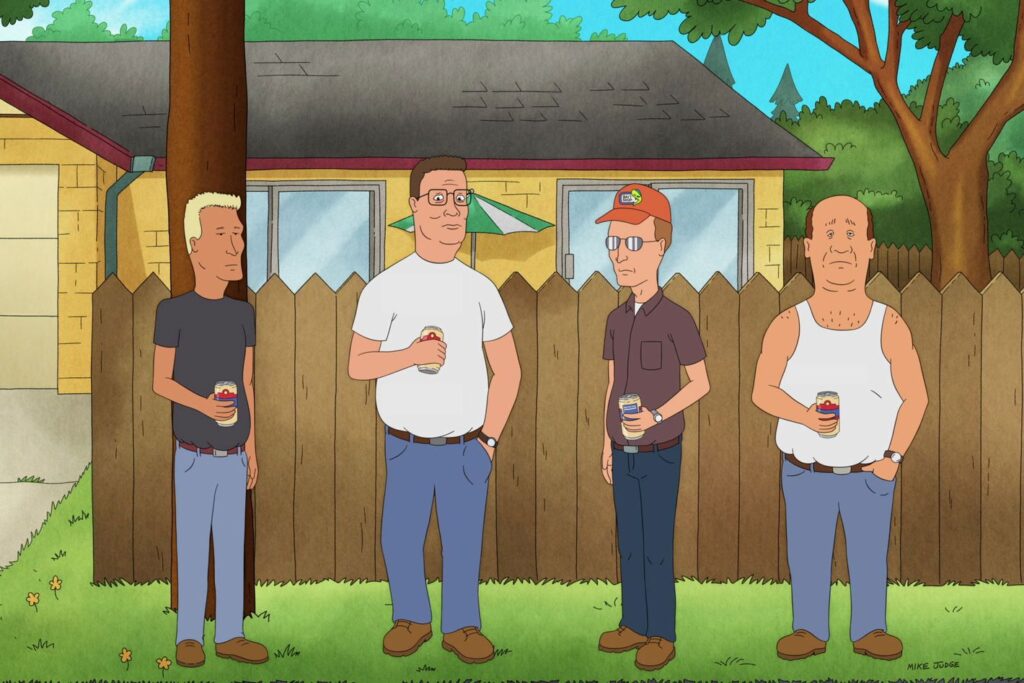
More than 15 years after Fox canceled it to make room for a Family Guy spinoff, Mike Judge and Greg Daniels’s King of the Hill is returning via Hulu, dragging Hank, Peggy, and Bobby Hill back into a world that’s plenty different from the one they left behind. It’s a tricky proposition. Revivals of beloved old shows are fairly common these days (hell, even Scrubs is coming back), but the track record isn’t exactly encouraging: For every solid Will & Grace return, you get about ten neo-Frasiers. The fundamental risk of such reconstitutions lies in their tendency to feel uncanny. They aim to tap into comforting nostalgia but more often than not end up provoking an unsettling line of inquiry: What did I actually love about the original? Was it ever good, or were my younger standards different? Has the show’s sensibility aged well? Has mine? With its quotidian nature and a central character whose whole deal is a steadfast old-fashionedness (“Why would anyone do drugs when they could just mow a lawn?”), King of the Hill feels uniquely suited to pressing these questions. Fifteen years is a long time, especially in an era where everything feels like it’s happening all at once. Which makes it all the more remarkable that King of the Hill’s return isn’t just good; it’s the best possible outcome for a nostalgia revival.
It might not feel that way at first. King of the Hill has always drawn its essence from Hank’s sense of being out of step with the times, and this belated 14th season’s premiere leans into the broadest version of that dynamic to reestablish its premise. In the first of the ten episodes dropping on August 4, we catch up with a newly retired Hank and Peggy returning from an extended stint in Saudi Arabia, where our ever-loyal propane advocate had been working for Aramco while living in an Americana-styled company town seemingly preserved in time. This is the show’s slightly absurd meta-explanation for its long hiatus and the Hills’ disorientation when they come home to a Texas now transformed by Ring cameras, smartphones, and the gig economy. (Not that such things aren’t available in Saudi Arabia. I wouldn’t worry about it.) Hank is perturbed by the passive-aggressive mechanics of the two-way ride-share rating system and baffled when he encounters a gender-neutral restroom: “Are we all-gender?” he asks Peggy.
These fish-out-of-water gags tap into the same sensibility that once led some viewers, along with plenty of people who never actually watched the show, to mistake King of the Hill for some right-wing send-up of liberal excess. To be fair, it’s kind of a strange time to return to Arlen. The show’s original run ended right on the edge of a rapid cultural shift: three years after the iPhone, two years before Twitter became widespread, and five years before Donald Trump descended the escalators at Trump Tower. In that context, revisiting a grounded animated sitcom about small-town Texans carries extra charge and weight. A character like Dale Gribble, for example, paranoid and conspiracy-theory-addled, just hits a little differently in an age shaped by QAnon, viral misinformation, and Epstein brain.
But the show was always more nuanced and subversive than it appears at first glance. Its comedy is observational rather than overtly satirical, far less biting than other Judge creations like Idiocracy and Silicon Valley. Unusually slice-of-life for a network cartoon, the original series presented Hank, a Reagan-adoring small-c conservative, as neither exemplar nor punch line. Same goes with the rest of Arlen, a textured and quietly diverse ecosystem of suburbanites, oddballs, immigrants, and whatever sad-sack category Bill Dauterive fits into. King of the Hill clearly enjoys poking fun at Hank and the people of Arlen, but it avoids making them the butt of the joke, and while Hank may often do the right thing, it’s not because the show insists on his worldview being unimpeachable. He’s just someone trying, as best he can, to be a decent person.
So it is with the revival. As the new season unfolds, the broadness of the proof-of-concept premiere, co-written by Judge, Daniels, and new showrunner Saladin K. Patterson, quickly dissipates, and the show slips smoothly back into business. By episode two, Hank and Bobby clash over competing visions of beer. By mid-season, Dale is convinced that Hank’s new, thoroughly un-American love of soccer could only be the result of a Manchurian Candidate–style brainwashing. By the end, Hank finds himself confronted by the manosphere, confused and appalled that such farcical aggro-masculinity could ever exist at all. It’s King of the Hill as we’ve always known it, a balance of absurdity and emotional realism that feels timeless and perfectly timed.
A big part of what makes it all work is the mostly seamless return of the original voice cast. Judge is back as Hank, his clipped enunciations as precise as ever. (You might’ve last heard him as an inept pharma exec on Adult Swim’s excellent Common Side Effects, which he and Daniels also helped produce.) Kathy Najimy and Pamela Adlon return as Peggy and adult Bobby, both in fine form. Some practical updates were unavoidable, though, several of them laced with sadness. Johnny Hardwick, who originally voiced Dale, died in 2023 shortly after recording began on this season; the character is now voiced by Toby Huss. (Huss, meanwhile, hands off his former role voicing the Hills’ neighbor Kahn Souphanousinphone to Ronny Chieng.) Brittany Murphy, who voiced Hank and Peggy’s niece Luanne Platter, died near the end of the show’s original run, and Tom Petty, who played Luanne’s boyfriend turned husband Lucky Kleinschmidt, died from an accidental overdose in 2017. Neither Lucky nor Luanne appears in this new season, and the show never directly acknowledges their absence, save for a lone, gut-punch needle drop. And while Jonathan Joss once again voices John Redcorn in these episodes, his tragic murder earlier this year hangs heavy over the season. It’s hard to watch King of the Hill now without feeling a quiet undertow of loss.
Nostalgia revivals have a way of forcing viewers to reckon with mortality. Frasier’s Paramount+ revival didn’t really work because it never figured out how to marry its old formula with its newer elements, leaving behind the fascinating, melancholic spectacle of Kelsey Grammer doing old Frasier Crane bits in a world that had moved on. On the other hand, And Just Like That … arguably works a little better because it leans hard into the aging of its characters (and its own ridiculousness, I suppose). King of the Hill, being animated, gets to sidestep some of that, but it doesn’t avoid change; as familiar as its rhythms are, it’s not entirely the same show. Peggy has wrinkle lines on her face. Connie Souphanousinphone is a grown woman. Most striking of all, Bobby is now an adult who skipped college to become the executive chef at a Japanese-German fusion restaurant. The Bobby material is perhaps the revival’s best thread. For years, he was the goofy, curious, prop-comedy-loving kid at the center of Hank’s paternal anxiety (“That boy ain’t right”). Now we see him as a young man, tentative and searching. Hank and an adult Bobby drinking beers together? That’s genuinely moving.
In many ways, though, it’s Hank’s old-fashionedness that makes King of the Hill’s return so surprisingly natural. He’s always been out of step with the culture, which means he’s never truly gone out of style. But what really gives the revival its staying power is its emotional core: a gentle sweetness that runs through Hank, the Hill family, and the town of Arlen. In that sense, King of the Hill unexpectedly shares a lot in common with another American icon who recently made a return: James Gunn’s Superman, currently in theaters. Both bring back distinctly American archetypes whose values — “truth and justice” is as much a Hank Hill–ism as it is Superman’s — feel positively quaint in a world spinning faster than ever. Both ask, What happens when your moral compass was set in a different era? Gunn’s superhero searches for answers while soaring through the sky. Hank finds them the way he always has: standing in an alley, drinking beers with his neighbors, quietly hanging on.
More TV Reviews
Related
King of the Hill’s belated 14th season is the best possible outcome for a nostalgia revival.

































































